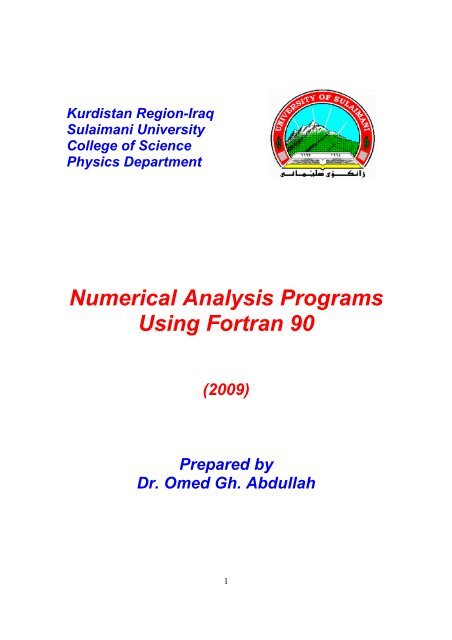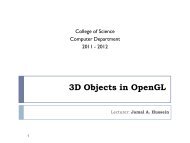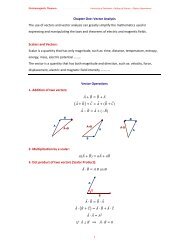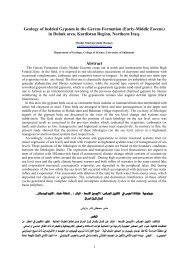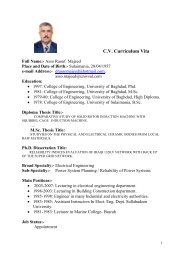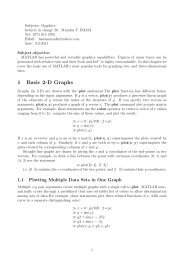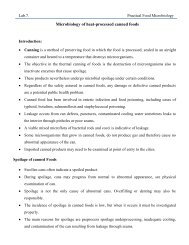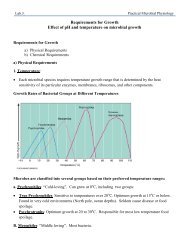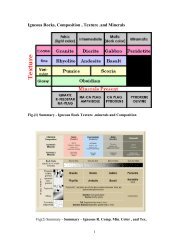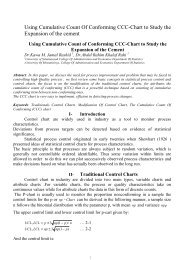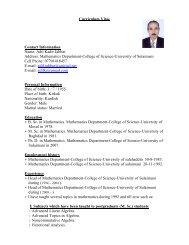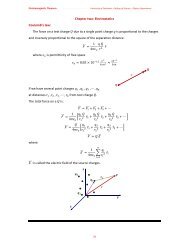Numerical Analysis Programs Using Fortran 90 - University of ...
Numerical Analysis Programs Using Fortran 90 - University of ...
Numerical Analysis Programs Using Fortran 90 - University of ...
Create successful ePaper yourself
Turn your PDF publications into a flip-book with our unique Google optimized e-Paper software.
Kurdistan Region-Iraq<br />
Sulaimani <strong>University</strong><br />
College <strong>of</strong> Science<br />
Physics Department<br />
<strong>Numerical</strong> <strong>Analysis</strong> <strong>Programs</strong><br />
<strong>Using</strong> <strong>Fortran</strong> <strong>90</strong><br />
(2009)<br />
Prepared by<br />
Dr. Omed Gh. Abdullah<br />
1
Problem: Write a program to find the roots <strong>of</strong> the equation<br />
x<br />
y = e − 3x<br />
using Bisection method in the interval [ 1,2]<br />
, within<br />
3<br />
the tolerance 10 − .<br />
f(x)=exp(x)-3*x<br />
tol=.001<br />
a=1<br />
b=2<br />
10 c=(a+b)/2<br />
print*,a,b,c<br />
if (f(c)*f(a))20,30,30<br />
20 b=c<br />
goto 40<br />
30 a=c<br />
40 if (abs (a-b).lt.tol) goto 50<br />
goto 10<br />
50 print*,'The Root is',c<br />
end<br />
^^^^^^^^^^^^^^^^^^^^^^^^^^^^^^^^^^^^^^^^^^^^^^^^^^^^^^^^^^^^^<br />
1.000000 2.000000 1.500000<br />
1.500000 2.000000 1.750000<br />
1.500000 1.750000 1.625000<br />
1.500000 1.625000 1.562500<br />
1.500000 1.562500 1.531250<br />
1.500000 1.531250 1.515625<br />
1.500000 1.515625 1.507813<br />
1.507813 1.515625 1.511719<br />
1.511719 1.515625 1.513672<br />
1.511719 1.513672 1.512695<br />
The Root is 1.512695<br />
2
Problem: Write a program to find the roots <strong>of</strong> the equation<br />
f ( x)<br />
= x sin( x)<br />
− 1 using False position method in the interval<br />
[ 1,2] , within the tolerance<br />
4<br />
10 − .<br />
f(x)=x*sin(x)-1<br />
tol=.0001<br />
a=1<br />
b=2<br />
10 c=(a*f(b)-b*f(a))/(f(b)-f(a))<br />
print*,a,b,c<br />
if (f(a)*f(c))20,30,30<br />
20 b=c<br />
goto 40<br />
30 a=c<br />
40 if (abs (a-b).lt.tol) goto 50<br />
goto 10<br />
50 print*,'The Root is',c<br />
end<br />
^^^^^^^^^^^^^^^^^^^^^^^^^^^^^^^^^^^^^^^^^^^^^^^^^^^^^^^^^^^^^<br />
1.000000 2.000000 1.162241<br />
1.000000 1.162241 1.114254<br />
1.000000 1.114254 1.114157<br />
The Root is 1.114157<br />
3
Problem: Write a program to find the roots <strong>of</strong> the equation<br />
x<br />
f ( x)<br />
= 3x<br />
+ sin x − e using Secant method in the interval [ 0,1]<br />
,<br />
4<br />
within the tolerance 10 − .<br />
f(x)=3*x+sin(x)-exp(x)<br />
tol=.00001<br />
x1=0<br />
x2=1<br />
10 x3=(x1*f(x2)-x2*f(x1))/(f(x2)-f(x1))<br />
print*,x1,x2,x3<br />
x1=x2<br />
x2=x3<br />
if (abs (x1-x2).lt.tol) goto 20<br />
goto 10<br />
20 print*,'The Root is',x3<br />
end<br />
^^^^^^^^^^^^^^^^^^^^^^^^^^^^^^^^^^^^^^^^^^^^^^^^^^^^^^^^^^^^^<br />
0.000000 1.000000 4.709896E-01<br />
1.000000 4.709896E-01 3.075085E-01<br />
4.709896E-01 3.075085E-01 3.626132E-01<br />
3.075085E-01 3.626132E-01 3.604615E-01<br />
3.626132E-01 3.604615E-01 3.604217E-01<br />
3.604615E-01 3.604217E-01 3.604217E-01<br />
The Root is 3.604217E-01<br />
4
Problem: Write a program to find the roots <strong>of</strong> the equation<br />
2<br />
f ( x)<br />
= x − 2x<br />
− 3 by iterative method, within the tolerance<br />
4<br />
10 − .<br />
read*,xo<br />
tol=0.0001<br />
5 x=sqrt(2*xo+3)<br />
print*,xo,x<br />
if(abs(x-xo)
Problem: Write a program using the Newton-Raphson procedure to<br />
3 2<br />
determine the roots <strong>of</strong> the equation f ( x)<br />
= x − x − 2x<br />
+ 1 ,<br />
6<br />
within the tolerance 10 − .<br />
f(x)=x**3-x**2-2*x+1<br />
df(x)=3*x**2-2*x-2<br />
tol=1e-6<br />
xo=2<br />
k=0<br />
10 k=k+1<br />
x=xo-f(xo)/df(xo)<br />
if(abs(x-xo).lt.tol) goto 20<br />
print *,k,x<br />
xo=x<br />
goto 10<br />
20 print *,'The Root is',x<br />
end<br />
^^^^^^^^^^^^^^^^^^^^^^^^^^^^^^^^^^^^^^^^^^^^^^^^^^^^^^^^^^^^^<br />
1 1.833333<br />
2 1.802935<br />
3 1.801939<br />
4 1.801938<br />
The Root is 1.801938<br />
If xo=0<br />
The Root is 4.450419E-01<br />
If xo=-1<br />
The Root is -1.246980<br />
6
Problem: Write a program to determine the roots <strong>of</strong> the equation<br />
4<br />
3<br />
2<br />
x −1.99x<br />
−1.76x<br />
+ 5.22x<br />
− 2.23 = 0 that are close to x = 1. 5<br />
by Newton-Raphson method.<br />
f(x)=x**4-1.99*x**3-1.76*x**2+5.22*x-2.23<br />
df(x)=4*x**3-5.97*x**2-3.52*x+5.22<br />
ddf(x)=12*x**2-11.94*x-3.52<br />
tol=0.00001<br />
x=1.5<br />
5 rat=df(x)/ddf(x)<br />
x=x-rat<br />
if(abs(rat)-tol)10,10,5<br />
10 eps=sqrt(-2*f(x)/ddf(x))<br />
sign=1<br />
do i=1,2<br />
k=0<br />
y=x+sign*eps<br />
15 k=k+1<br />
print *,y<br />
rat=f(y)/df(y)<br />
y=y-rat<br />
if (abs(rat)-tol)20,15,15<br />
20 sign=-1<br />
print*,'++++++++++++++++++++++++++++++++'<br />
enddo<br />
end<br />
^^^^^^^^^^^^^^^^^^^^^^^^^^^^^^^^^^^^^^^^^^^^^^^^^^^^^^^^^^^^^<br />
1.569134<br />
1.565973<br />
1.565888<br />
++++++++++++++++++++++++++<br />
1.428165<br />
1.424016<br />
1.424112<br />
++++++++++++++++++++++++++<br />
7
Problem: Write a program to determine the roots <strong>of</strong> the equation<br />
4<br />
3<br />
2<br />
x −1.99x<br />
−1.76x<br />
+ 5.22x<br />
− 2.23 = 0 that are close to x = 1. 5<br />
by Newton-Raphson method.<br />
f(x)=x**4-1.99*x**3-1.76*x**2+5.22*x-2.23<br />
df(x)=4*x**3-5.97*x**2-3.52*x+5.22<br />
ddf(x)=12*x**2-11.94*x-3.52<br />
tol=0.00001<br />
xo=1.5<br />
10 x=xo-df(xo)/ddf(xo)<br />
if(abs(x-xo).lt.tol) goto 20<br />
xo=x<br />
goto 10<br />
20 eps=sqrt(-2*f(x)/ddf(x))<br />
y1=x+eps<br />
30 y=y1-f(y1)/df(y1)<br />
if(abs(y-y1).lt.tol) goto 40<br />
print *,y<br />
y1=y<br />
goto 30<br />
40 print *,'The First Root is',y<br />
print*,'************************'<br />
y1=x-eps<br />
50 y=y1-f(y1)/df(y1)<br />
if(abs(y-y1).lt.tol) goto 60<br />
print *,y<br />
y1=y<br />
goto 50<br />
60 print *,'The Second Root is',y<br />
end<br />
^^^^^^^^^^^^^^^^^^^^^^^^^^^^^^^^^^^^^^^^^^^^^^^^^^^^^^^^^^^^^<br />
1.565973<br />
1.565888<br />
The First Root is 1.565888<br />
************************************<br />
1.424016<br />
1.424112<br />
The Second Root is 1.424112<br />
++++++++++++++++++++++++++<br />
8
Problem: Write a program to determine the roots <strong>of</strong> the equation<br />
3 2<br />
8x − 20x<br />
− 26x<br />
+ 33 = 0 that are close to x = 0. 8 using Birge-<br />
Vieta method.<br />
dimension a(0:10),b(0:10),c(0:10)<br />
a(0)=8<br />
a(1)=-20<br />
a(2)=-26<br />
a(3)=33<br />
m=3<br />
xo=0.8<br />
tol=1e-6<br />
5 k=k+1<br />
b(0)=a(0); c(0)=b(0)<br />
do j=1,m<br />
b(j)=a(j)+xo*b(j-1)<br />
c(j)=b(j)+xo*c(j-1)<br />
enddo<br />
x=xo-b(m)/c(m-1)<br />
print *,k,x<br />
if(abs(x-xo)
Problem: Write a program to determine the roots <strong>of</strong> the equation<br />
3 2<br />
8x − 20x<br />
− 26x<br />
+ 33 = 0 that are close to x = 0. 8 using Birge-<br />
Vieta method.<br />
dimension a(0:10),b(0:10),c(0:10)<br />
data (a(i),i=0,3)/8,-20,-26,33/<br />
m=3<br />
k=0<br />
xo=0.8<br />
tol=1e-6<br />
5 k=k+1<br />
b(0)=a(0); c(0)=b(0)<br />
do j=1,m<br />
b(j)=a(j)+xo*b(j-1)<br />
c(j)=b(j)+xo*c(j-1)<br />
enddo<br />
x=xo-b(m)/c(m-1)<br />
print *,k,x<br />
if(abs(x-xo)
Problem: Write a program to determine the roots <strong>of</strong> the system <strong>of</strong><br />
2<br />
2<br />
equations x + xy −10<br />
= 0 ; y + 3xy<br />
− 57 = 0<br />
using the fixed point iteration. Initiate the computation with<br />
guesses <strong>of</strong> x = 1. 5 and y = 3. 5 .<br />
xo=1.5<br />
yo=3.5<br />
tol=0.0001<br />
5 x=sqrt(10-xo*yo)<br />
y=sqrt((57-yo)/(3*x))<br />
print*,x,y<br />
if((abs(x-xo)
Problem: Write a program to solve the following system <strong>of</strong> equations,<br />
by using Newton-Raphson Method<br />
2<br />
2<br />
x − y − 0.2 = 0 ; y − x − 0.3 = 0<br />
Initiate the computation with guesses <strong>of</strong> x = 1. 2 and y = 1. 2 .<br />
f(x,y)=x**2-y-.2<br />
g(x,y)=y**2-x-.3<br />
fx(x,y)=2*x<br />
fy(x,y)=-1<br />
gx(x,y)=-1<br />
gy(x,y)=2*y<br />
xo=1.2<br />
yo=1.2<br />
tol=0.0001<br />
5 xj=fx(xo,yo)*gy(xo,yo)-fy(xo,yo)*gx(xo,yo)<br />
hh=(g(xo,yo)*fy(xo,yo)-f(xo,yo)*gy(xo,yo))/xj<br />
hk=(f(xo,yo)*gx(xo,yo)-g(xo,yo)*fx(xo,yo))/xj<br />
x=xo+hh<br />
y=yo+hk<br />
print*,x,y<br />
if((abs(x-xo)
Problem: Write a program to find the interpolated value for x =1. 15,<br />
using Newton forward method, for these tabulated data.<br />
X 1 1.2 1.4 1.6 1.8 2.0<br />
f 2.317 2.425 2.522 2.609 2.689 2.762<br />
program Newton_Forward_Iterpolation<br />
dimension x(20),y(20),d(20,20)<br />
n=6<br />
xx=1.15<br />
data (x(i), i=1,6) /1,1.2,1.4,1.6,1.8,2/<br />
data (y(i), i=1,6)/2.317,2.425,2.522,2.609,2.689,2.762/<br />
print*,(x(i), i=1,6)<br />
print*,(y(i), i=1,6)<br />
s=y(1)<br />
do i=1,n-1<br />
do j=1,n-i<br />
y(j)=y(j+1)-y(j)<br />
d(i,j)=y(j)<br />
enddo<br />
enddo<br />
r=(xx-x(1))/(x(2)-x(1))<br />
do i=1,n-1<br />
p=1<br />
do j=0,i-1<br />
p=p*(r-j)<br />
enddo<br />
f=1<br />
do j=1,i; f=f*j; enddo<br />
s=s+d(i,1)*p/f<br />
enddo<br />
print*,'Interpolation <strong>of</strong>(',xx,')=',s<br />
end<br />
^^^^^^^^^^^^^^^^^^^^^^^^^^^^^^^^^^^^^^^^^^^^^^^^^^^^^^^^^^^^^<br />
Interpolation <strong>of</strong> (1.15)= 2.398955<br />
13
Problem: Write a program to find the interpolated value for x =1. 15,<br />
using Newton forward method, for these tabulated data.<br />
X 1 1.2 1.4 1.6 1.8 2.0<br />
f 2.317 2.425 2.522 2.609 2.689 2.762<br />
dimension f(0:20),diff(0:20)<br />
xo=1<br />
x=1.15<br />
h=0.2<br />
n=5<br />
data (f(i), i=0,5)/2.317,2.425,2.522,2.609,2.689,2.762/<br />
r=(x-xo)/h<br />
do i=0,n-1<br />
diff(i)=f(i+1)-f(i)<br />
enddo<br />
coeff=r<br />
yx=f(0)+coeff*diff(0)<br />
do i=2,n<br />
coeff=coeff*(r-i+1)/(i)<br />
do j=0,n-i<br />
diff(j)=diff(j+1)-diff(j)<br />
enddo<br />
yx=yx+coeff*diff(0)<br />
enddo<br />
print*,yx<br />
end<br />
^^^^^^^^^^^^^^^^^^^^^^^^^^^^^^^^^^^^^^^^^^^^^^^^^^^^^^^^^^^^^<br />
Interpolation <strong>of</strong> (1.15)= 2.398955<br />
14
Problem: Write a program to find the interpolated value for x = 0. 55,<br />
using Newton forward method, for these tabulated data.<br />
X 0.5 0.7 0.9 1.1 1.3 1.5<br />
Y 0.47943 0.64422 0.78333 0.89121 0.96356 0.99749<br />
dimension y(20),diff(20)<br />
x0=0.5<br />
x=0.55<br />
h=0.2<br />
n=6<br />
m=4<br />
data (y(i), i=1,6) /0.47943,0.64422,0.78333,0.89121,0.96356,0.99749/<br />
j=int((x-x0)/h-0.5)<br />
r=(x-x0)/h-j<br />
if ((j.ge.0).and.(j.lt.n-m)) goto 10<br />
print*,'Not enough function values'<br />
goto 20<br />
10 do i=1,m-1<br />
diff(i)=y(j+i+1)-y(j+i)<br />
enddo<br />
coeff=r<br />
yx=y(1)+coeff*diff(1)<br />
do i=2,m-1<br />
coeff=coeff*(r-i+1)/i<br />
do j=1,m-i<br />
diff(j)=diff(j+1)-diff(j)<br />
enddo<br />
yx=yx+coeff*diff(1)<br />
enddo<br />
print*,'Interpolation <strong>of</strong>(',xx,')=',yx<br />
20 end<br />
^^^^^^^^^^^^^^^^^^^^^^^^^^^^^^^^^^^^^^^^^^^^^^^^^^^^^^^^^^^^^<br />
Interpolation <strong>of</strong> (0.55)= 5.227315 E-01<br />
15
Problem: Write a program to find the interpolated value for x =1. 93,<br />
using Newton backward method, for these tabulated data.<br />
X 1 1.2 1.4 1.6 1.8 2.0<br />
f 2.317 2.425 2.522 2.609 2.689 2.762<br />
program Newton_Backward_Iterpolation<br />
dimension x(20),y(20),d(20,20)<br />
n=6<br />
xx=1.93<br />
data (x(i), i=1,6) /1,1.2,1.4,1.6,1.8,2/<br />
data (y(i), i=1,6)/2.317,2.425,2.522,2.609,2.689,2.762/<br />
print*,(x(i), i=1,6)<br />
print*,(y(i), i=1,6)<br />
s=y(n)<br />
do i=1,n-1<br />
do j=1,n-i<br />
y(j)=y(j+1)-y(j)<br />
d(i,j)=y(j)<br />
enddo<br />
enddo<br />
r=(xx-x(n))/(x(2)-x(1))<br />
do i=1,n-1<br />
p=1<br />
do j=0,i-1<br />
p=p*(r+j)<br />
enddo<br />
f=1<br />
do j=1,i; f=f*j; enddo<br />
s=s+d(i,n-i)*p/f<br />
enddo<br />
print*,'Interpolation <strong>of</strong>(',xx,')=',s<br />
end<br />
^^^^^^^^^^^^^^^^^^^^^^^^^^^^^^^^^^^^^^^^^^^^^^^^^^^^^^^^^^^<br />
Interpolation <strong>of</strong>(1.93)=2.737522<br />
16
Problem: Write a program to find the interpolated value for x =1. 47 ,<br />
using Newton backward method, for these tabulated data.<br />
x 0.5 0.7 0.9 1.1 1.3 1.5<br />
y 0.47943 0.64422 0.78333 0.89121 0.96356 0.99749<br />
program Newton_Backward_Iterpolation<br />
dimension x(20),y(20),d(20,20)<br />
n=6<br />
xx=1.47<br />
data (x(i), i=1,6)/.5,.7,.9,1.1,1.3,1.5/<br />
data (y(i), i=1,6) /0.47943,0.64422,0.78333,0.89121,0.96356,0.99749/<br />
print*,(x(i), i=1,6)<br />
print*,(y(i), i=1,6)<br />
s=y(n)<br />
do i=1,n-1<br />
do j=1,n-i<br />
y(j)=y(j+1)-y(j)<br />
d(i,j)=y(j)<br />
enddo<br />
enddo<br />
r=(xx-x(n))/(x(2)-x(1))<br />
do i=1,n-1<br />
p=1<br />
do j=0,i-1<br />
p=p*(r+j)<br />
enddo<br />
f=1<br />
do j=1,i; f=f*j; enddo<br />
s=s+d(i,n-i)*p/f<br />
enddo<br />
print*,'Interpolation <strong>of</strong>(',xx,')=',s<br />
end<br />
^^^^^^^^^^^^^^^^^^^^^^^^^^^^^^^^^^^^^^^^^^^^^^^^^^^^^^^^^^^<br />
Interpolation <strong>of</strong>(1.47)= 9.9492 E-01<br />
17
Problem: Write a program to find the interpolated value for x =1. 05 ,<br />
using Stirling Interpolation method, for these tabulated data.<br />
X 0.5 0.7 0.9 1.1 1.3 1.5<br />
y 0.48 0.64 0.78 0.89 0.96 0.99<br />
program Stirling_Formula_Iterpolation<br />
dimension x(20),y(20),d(20,20)<br />
n=6<br />
xx=1.05<br />
data (x(i), i=1,6) /.5,.7,.9,1.1,1.3,1.5/<br />
data (y(i), i=1,6)/.48,.64,.78,.89,.96,.99/<br />
print*,(x(i), i=1,6)<br />
print*,(y(i), i=1,6)<br />
s=y(4)<br />
do i=1,n-1<br />
do j=1,n-i<br />
y(j)=y(j+1)-y(j)<br />
d(i,j)=y(j)<br />
print*,d(i,j)<br />
enddo<br />
enddo<br />
r=(xx-x(4))/(x(2)-x(1))<br />
p1=r*(d(1,3)+d(1,4))/2<br />
p2=r**2/2*d(2,3)<br />
p3=r*(r**2-1)/6*(d(3,2)+d(3,3))/2<br />
p4=r**2*(r**2-1)/24*d(4,2)<br />
s=s+p1+p2+p3+p4<br />
print*,'Interpolation <strong>of</strong>(',xx,')=',s<br />
end<br />
^^^^^^^^^^^^^^^^^^^^^^^^^^^^^^^^^^^^^^^^^^^^^^^^^^^^^^^^^^^<br />
Interpolation <strong>of</strong>(1.05)=8.660302 E-01<br />
18
Problem: Write a program to find the interpolated value for x =1. 05 ,<br />
using Bessel’s Interpolation method, for these tabulated data.<br />
X 0.5 0.7 0.9 1.1 1.3 1.5<br />
y 0.48 0.64 0.78 0.89 0.96 0.99<br />
program Bessels_Formula_Iterpolation<br />
dimension x(20),y(20),d(20,20)<br />
n=6<br />
xx=1.05<br />
data (x(i), i=1,6) /.5,.7,.9,1.1,1.3,1.5/<br />
data (y(i), i=1,6)/.48,.64,.78,.89,.96,.99/<br />
print*,(x(i), i=1,6)<br />
print*,(y(i), i=1,6)<br />
s=(y(3)+y(4))/2<br />
do i=1,n-1<br />
do j=1,n-i<br />
y(j)=y(j+1)-y(j)<br />
d(i,j)=y(j)<br />
print*,d(i,j)<br />
enddo<br />
enddo<br />
r=(xx-x(3))/(x(2)-x(1))<br />
p1=(r-.5)*d(1,3)<br />
p2=r*(r-1)/2*(d(2,2)+d(2,3))/2<br />
p3=r*(r-1)*(r-.5)/6*d(3,2)<br />
p4=r*(r-1)*(r+1)*(r-2)/24*(d(4,1)+d(4,2))/2<br />
s=s+p1+p2+p3+p4<br />
print*,'Interpolation <strong>of</strong>(',xx,')=',s<br />
end<br />
^^^^^^^^^^^^^^^^^^^^^^^^^^^^^^^^^^^^^^^^^^^^^^^^^^^^^^^^^^^<br />
Interpolation <strong>of</strong>(1.05)=8.659448 E-01<br />
19
Problem: Write a program to find the interpolated value for x = 0. 7 ,<br />
using divided difference formula, for these tabulated data.<br />
X 0 0.5 1 1.4 2 3.2 5.5<br />
F(x) -1.25 -3.5 6 2.32 1.5 1.27 5.6<br />
program Divided_Differences_Iterpolation<br />
dimension x(20),y(20),d(20,20)<br />
n=7<br />
xx=.7<br />
data (x(i), i=1,7) /0,.5,1,1.4,2,3.2,5.5/<br />
data (y(i), i=1,7)/-1.25,-3.5,6,2.32,1.5,1.27,5.6/<br />
s=y(1)<br />
do i=1,n-1<br />
do j=1,n-i<br />
y(j)=(y(j+1)-y(j))/(x(j+i)-x(j))<br />
d(i,j)=y(j)<br />
print*,d(i,j)<br />
enddo<br />
enddo<br />
do i=1,n-1<br />
p=1<br />
do j=1,i<br />
p=p*(xx-x(j))<br />
enddo<br />
s=s+d(i,1)*p<br />
enddo<br />
print*,'Interpolation <strong>of</strong>(',xx,')=',s<br />
end<br />
^^^^^^^^^^^^^^^^^^^^^^^^^^^^^^^^^^^^^^^^^^^^^^^^^^^^^^^^^^^^^<br />
Interpolation <strong>of</strong> (0.7) =2.2<strong>90</strong>929<br />
20
Problem: Write a program to find the interpolated value for x =1. 5,<br />
using divided difference formula, for these tabulated data.<br />
X 1 2 3 4 5<br />
F(x) 0 1 4 6 10<br />
program Divided_Differences_Iterpolation<br />
dimension x(20),y(20),d(20,20)<br />
n=5<br />
xx=1.5<br />
data (x(i), i=1,5)/1,2,3,4,5/<br />
data (y(i), i=1,5)/0,1,4,6,10/<br />
s=y(1)<br />
do i=1,n-1<br />
do j=1,n-i<br />
y(j)=(y(j+1)-y(j))/(x(j+i)-x(j))<br />
d(i,j)=y(j)<br />
enddo<br />
enddo<br />
do i=1,n-1<br />
p=1<br />
do j=1,i<br />
p=p*(xx-x(j))<br />
enddo<br />
s=s+d(i,1)*p<br />
enddo<br />
print*,'Interpolation <strong>of</strong>(',xx,')=',s<br />
end<br />
^^^^^^^^^^^^^^^^^^^^^^^^^^^^^^^^^^^^^^^^^^^^^^^^^^^^^^^^^^^^^<br />
Interpolation <strong>of</strong> (1.5) = -0.171875<br />
21
Problem: Write a program to find the interpolated value for x = 3, using<br />
Lagrangian Polynomial, from the following data.<br />
X 3.2 2.7 1 4.8<br />
F(x) 22 17.8 14.2 38.3<br />
program Lagrange_Iterpolation<br />
dimension x(20),y(20)<br />
n=4<br />
xx=3<br />
data (x(i), i=1,4)/3.2,2.7,1,4.8/<br />
data (y(i), i=1,4)/22,17.8,14.2,38.3/<br />
s=0<br />
do i=1,n<br />
p=1<br />
do j=1,n<br />
if (i.eq.j) goto 5<br />
p=p*(xx-x(j))/(x(i)-x(j))<br />
5 enddo<br />
s=s+p*y(i)<br />
enddo<br />
print*,'Interpolation <strong>of</strong>(',xx,')=',s<br />
end<br />
^^^^^^^^^^^^^^^^^^^^^^^^^^^^^^^^^^^^^^^^^^^^^^^^^^^^^^^^^^^^^<br />
Interpolation <strong>of</strong> (3) = 20.21196<br />
22
Problem:<br />
Write a program to determine the parameters a<br />
1 & a<br />
2 so that<br />
( x)<br />
= a + a x , fits the following data in least squares sense.<br />
f<br />
1 2<br />
X 0 0.3 0.6 0.9 1.2 1.5 1.8 2.1<br />
y 1 2.7 4.3 6 7.5 9 10.6 12<br />
program List_Square_Fitting<br />
dimension x(20),y(20),f(20)<br />
n=8<br />
data (x(i), i=1,8)/0,.3,.6,.9,1.2,1.5,1.8,2.1/<br />
data (y(i), i=1,8)/1,2.7,4.3,6,7.5,9,10.6,12/<br />
sx=0; sxx=0;sy=0;sxy=0<br />
do i=1,n<br />
sx=sx+x(i)<br />
sy=sy+y(i)<br />
sxx=sxx+x(i)**2<br />
sxy=sxy+x(i)*y(i)<br />
enddo<br />
print *,'sx=',sx<br />
print *,'sxx=',sxx<br />
print *,'sy=',sy<br />
print *,'sxy=',sxy<br />
d=n*sxx-sx**2<br />
a1=(sxx*sy-sx*sxy)/d<br />
a2=(n*sxy-sx*sy)/d<br />
print*,'a1=',a1<br />
print*,'a2=',a2<br />
s=0<br />
do i=1,n<br />
f(i)=a1+a2*x(i)<br />
s=s+(y(i)-f(i))**2<br />
enddo<br />
print*,'Standerd Deviation=',s<br />
end<br />
^^^^^^^^^^^^^^^^^^^^^^^^^^^^^^^^^^^^^^^^^^^^^^^^^^^^^^^^^^^^^^<br />
sx=8.4 sxx=12.6 sy=53.1 sxy=75.57<br />
a1=1.133333<br />
a2=5.242064<br />
Standard deviation = 6.726178 E -02<br />
23
Problem:<br />
Write a program to determine the parameters A & B so that<br />
f ( x)<br />
= A ln( x)<br />
+ B , fits the following data in least squares sense.<br />
X 0.1 0.2 0.3 0.4 0.5 0.6 0.7 0.8 0.9<br />
y 0.27 0.72 1.48 2.66 4.48 7.26 11.43 17.64 26.78<br />
program List_Square_Fitting<br />
dimension x(20),y(20),f(20)<br />
n=9<br />
data (x(i), i=1,9)/.1,.2,.3,.4,.5,.6,.7,.8,.9/<br />
data (y(i), i=1,9)/.27,.72,1.48,2.66,4.48,7.26,11.43,17.64,26.78/<br />
sx=0; sxx=0;sy=0;sxy=0<br />
do i=1,n<br />
sx=sx+log(x(i))<br />
sy=sy+y(i)<br />
sxx=sxx+(log(x(i)))**2<br />
sxy=sxy+log(x(i))*y(i)<br />
enddo<br />
print *,'sx=',sx<br />
print *,'sxx=',sxx<br />
print *,'sy=',sy<br />
print *,'sxy=',sxy<br />
d=n*sxx-sx**2<br />
a1=(sxx*sy-sx*sxy)/d<br />
a2=(n*sxy-sx*sy)/d<br />
a=a2; b=a1<br />
print*,'A=',a<br />
print*,'B=',b<br />
s=0<br />
do i=1,n<br />
f(i)=a*log(x(i))+b<br />
s=s+(y(i)-f(i))**2<br />
enddo<br />
print*,'Standerd Deviation=',s<br />
end<br />
^^^^^^^^^^^^^^^^^^^^^^^^^^^^^^^^^^^^^^^^^^^^^^^^^^^^^^^^^^^^^^<br />
A=9.74113 B=16.66255<br />
S=260.5141<br />
24
Problem:<br />
Write a program to determine the parameters A & C so that<br />
f =<br />
A x<br />
( x)<br />
C e , fits the following data in least squares sense.<br />
X 0.1 0.2 0.3 0.4 0.5 0.6 0.7 0.8 0.9<br />
y 0.27 0.72 1.48 2.66 4.48 7.26 11.43 17.64 26.78<br />
program List_Square_Fitting<br />
dimension x(20),y(20),f(20)<br />
n=9<br />
data (x(i), i=1,9)/.1,.2,.3,.4,.5,.6,.7,.8,.9/<br />
data (y(i), i=1,9)/.27,.72,1.48,2.66,4.48,7.26,11.43,17.64,26.78/<br />
sx=0; sxx=0;sy=0;sxy=0<br />
do i=1,n<br />
sx=sx+x(i)<br />
sy=sy+log(y(i))<br />
sxx=sxx+(x(i))**2<br />
sxy=sxy+x(i)*log(y(i))<br />
enddo<br />
print *,'sx=',sx<br />
print *,'sxx=',sxx<br />
print *,'sy=',sy<br />
print *,'sxy=',sxy<br />
d=n*sxx-sx**2<br />
a1=(sxx*sy-sx*sxy)/d<br />
a2=(n*sxy-sx*sy)/d<br />
a=a2; c=exp(a1)<br />
print*,'A=',a<br />
print*,'C=',c<br />
s=0<br />
do i=1,n<br />
f(i)=c*exp(a*x(i))<br />
s=s+(y(i)-f(i))**2<br />
enddo<br />
print*,'Standerd Deviation=',s<br />
end<br />
^^^^^^^^^^^^^^^^^^^^^^^^^^^^^^^^^^^^^^^^^^^^^^^^^^^^^^^^^^^^^^<br />
A= 5.512738<br />
C= .2359106<br />
S=52.53117<br />
25
Problem:<br />
Write a program to determine the parameters A & C so that<br />
A<br />
f ( x)<br />
= C x , fits the following data in least squares sense.<br />
X 0.1 0.2 0.3 0.4 0.5 0.6 0.7 0.8 0.9<br />
y 0.27 0.72 1.48 2.66 4.48 7.26 11.43 17.64 26.78<br />
program List_Square_Fitting<br />
dimension x(20),y(20),f(20)<br />
n=9<br />
data (x(i), i=1,9)/.1,.2,.3,.4,.5,.6,.7,.8,.9/<br />
data (y(i), i=1,9)/.27,.72,1.48,2.66,4.48,7.26,11.43,17.64,26.78/<br />
sx=0; sxx=0;sy=0;sxy=0<br />
do i=1,n<br />
sx=sx+log(x(i))<br />
sy=sy+log(y(i))<br />
sxx=sxx+(log(x(i)))**2<br />
sxy=sxy+log(x(i))*log(y(i))<br />
enddo<br />
print *,'sx=',sx<br />
print *,'sxx=',sxx<br />
print *,'sy=',sy<br />
print *,'sxy=',sxy<br />
d=n*sxx-sx**2<br />
a1=(sxx*sy-sx*sxy)/d<br />
a2=(n*sxy-sx*sy)/d<br />
a=a2; c=exp(a1)<br />
print*,'A=',a<br />
print*,'C=',c<br />
s=0<br />
do i=1,n<br />
f(i)=c*x(i)**a<br />
s=s+(y(i)-f(i))**2<br />
enddo<br />
print*,'Standerd Deviation=',s<br />
end<br />
^^^^^^^^^^^^^^^^^^^^^^^^^^^^^^^^^^^^^^^^^^^^^^^^^^^^^^^^^^^^^^<br />
A= 2.092605<br />
C= 23.42711<br />
S= 75.07242<br />
26
Problem:<br />
Write a program to determine the parameters C & D so that<br />
D x<br />
f ( x)<br />
= C x e , fits the following data in least squares sense.<br />
X 0.1 0.2 0.3 0.4 0.5 0.6 0.7 0.8 0.9<br />
y 0.27 0.72 1.48 2.66 4.48 7.26 11.4 17.6 26.7<br />
3 4 8<br />
program List_Square_Fitting<br />
dimension x(20),y(20),f(20)<br />
n=9<br />
data (x(i), i=1,9)/.1,.2,.3,.4,.5,.6,.7,.8,.9/<br />
data (y(i), i=1,9)/.27,.72,1.48,2.66,4.48,7.26,11.43,17.64,26.78/<br />
sx=0; sxx=0;sy=0;sxy=0<br />
do i=1,n<br />
sx=sx+x(i)<br />
sy=sy+log(y(i)/x(i))<br />
sxx=sxx+x(i)**2<br />
sxy=sxy+x(i)*log(y(i)/x(i))<br />
enddo<br />
print *,'sx=',sx<br />
print *,'sxx=',sxx<br />
print *,'sy=',sy<br />
print *,'sxy=',sxy<br />
d=n*sxx-sx**2<br />
a1=(sxx*sy-sx*sxy)/d<br />
a2=(n*sxy-sx*sy)/d<br />
d=a2; c=exp(a1)<br />
print*,'D=',d<br />
print*,'C=',c<br />
s=0<br />
do i=1,n<br />
f(i)=c*x(i)*exp(d*x(i))<br />
s=s+(y(i)-f(i))**2<br />
enddo<br />
print*,'Standerd Deviation=',s<br />
end<br />
^^^^^^^^^^^^^^^^^^^^^^^^^^^^^^^^^^^^^^^^^^^^^^^^^^^^^^^^^^^^^^<br />
C= 1.993407<br />
D= 3.004763<br />
S= 1.117279 E-01<br />
27
Problem:<br />
Write a program to determine the parameters A & B so that<br />
A<br />
f ( x)<br />
= + B , fits the following data in least squares sense.<br />
x<br />
X 0.5 2 3.5 4.1 5 6.2 7.5 9.2<br />
y 3.3 2 1.4 1.2 1 0.8 0.64 0.5<br />
program List_Square_Fitting<br />
dimension x(20),y(20),f(20)<br />
n=8<br />
data (x(i), i=1,8)/.5,2,3.5,4.1,5,6.2,7.5,9.2/<br />
data (y(i), i=1,8)/3.3,2,1.4,1.2,1,.8,.64,.5/<br />
sx=0; sxx=0;sy=0;sxy=0<br />
do i=1,n<br />
sx=sx+1/x(i)<br />
sy=sy+y(i)<br />
sxx=sxx+(1/x(i))**2<br />
sxy=sxy+y(i)*(1/x(i))<br />
enddo<br />
print *,'sx=',sx<br />
print *,'sxx=',sxx<br />
print *,'sy=',sy<br />
print *,'sxy=',sxy<br />
d=n*sxx-sx**2<br />
a1=(sxx*sy-sx*sxy)/d<br />
a2=(n*sxy-sx*sy)/d<br />
a=a2; b=a1<br />
print*,'A=',a<br />
print*,'B=',b<br />
s=0<br />
do i=1,n<br />
f(i)=a/x(i)+b<br />
s=s+(y(i)-f(i))**2<br />
enddo<br />
print*,'Standerd Deviation=',s<br />
end<br />
^^^^^^^^^^^^^^^^^^^^^^^^^^^^^^^^^^^^^^^^^^^^^^^^^^^^^^^^^^^^^^<br />
A= 1.353131<br />
B= .7405201<br />
S=.7070401<br />
28
Problem:<br />
Write a program to determine the parameters D & C so that<br />
D<br />
f ( x)<br />
= , fits the following data in least squares sense.<br />
x + C<br />
X 0.5 2 3.5 4.1 5 6.2 7.5 9.2<br />
y 3.3 2 1.4 1.2 1 0.8 0.64 0.5<br />
program List_Square_Fitting<br />
dimension x(20),y(20),f(20)<br />
n=8<br />
data (x(i), i=1,8)/.5,2,3.5,4.1,5,6.2,7.5,9.2/<br />
data (y(i), i=1,8)/3.3,2,1.4,1.2,1,.8,.64,.5/<br />
sx=0; sxx=0;sy=0;sxy=0<br />
do i=1,n<br />
sx=sx+x(i)*y(i)<br />
sy=sy+y(i)<br />
sxx=sxx+(x(i)*y(i))**2<br />
sxy=sxy+(x(i)*y(i))*y(i)<br />
enddo<br />
print *,'sx=',sx<br />
print *,'sxx=',sxx<br />
print *,'sy=',sy<br />
print *,'sxy=',sxy<br />
d=n*sxx-sx**2<br />
a1=(sxx*sy-sx*sxy)/d<br />
a2=(n*sxy-sx*sy)/d<br />
c=-1/a2; d=a1*c<br />
print*,'C=',c<br />
print*,'D=',d<br />
s=0<br />
do i=1,n<br />
f(i)=d/(x(i)+c)<br />
s=s+(y(i)-f(i))**2<br />
enddo<br />
print*,'Standerd Deviation=',s<br />
end<br />
^^^^^^^^^^^^^^^^^^^^^^^^^^^^^^^^^^^^^^^^^^^^^^^^^^^^^^^^^^^^^^<br />
C= 1.369226<br />
D= 6.20<strong>90</strong>51<br />
S=5.723841 E-02<br />
29
Problem:<br />
Write a program to determine the parameters A & B so that<br />
1<br />
f ( x)<br />
= , fits the following data in least squares sense.<br />
A x + B<br />
X 0.5 2 3.5 4.1 5 6.2 7.5 9.2<br />
y 3.3 2 1.4 1.2 1 0.8 0.64 0.5<br />
program List_Square_Fitting<br />
dimension x(20),y(20),f(20)<br />
n=8<br />
data (x(i), i=1,8)/.5,2,3.5,4.1,5,6.2,7.5,9.2/<br />
data (y(i), i=1,8)/3.3,2,1.4,1.2,1,.8,.64,.5/<br />
sx=0; sxx=0;sy=0;sxy=0<br />
do i=1,n<br />
sx=sx+x(i)<br />
sy=sy+1/y(i)<br />
sxx=sxx+x(i)**2<br />
sxy=sxy+x(i)*1/y(i)<br />
enddo<br />
print *,'sx=',sx<br />
print *,'sxx=',sxx<br />
print *,'sy=',sy<br />
print *,'sxy=',sxy<br />
d=n*sxx-sx**2<br />
a1=(sxx*sy-sx*sxy)/d<br />
a2=(n*sxy-sx*sy)/d<br />
a=a2; b=a1<br />
print*,'A=',a<br />
print*,'B=',b<br />
s=0<br />
do i=1,n<br />
f(i)=1/(a*x(i)+b)<br />
s=s+(y(i)-f(i))**2<br />
enddo<br />
print*,'Standerd Deviation=',s<br />
end<br />
^^^^^^^^^^^^^^^^^^^^^^^^^^^^^^^^^^^^^^^^^^^^^^^^^^^^^^^^^^^^^^<br />
A= 1.953443 E-01<br />
B= 9.250808 E-02<br />
S= 3.864387<br />
30
Problem:<br />
Write a program to determine the parameters A & B so that<br />
x<br />
f ( x)<br />
= , fits the following data in least squares sense.<br />
A x + B<br />
X 0.5 2 3.5 4.1 5 6.2 7.5 9.2<br />
y 3.3 2 1.4 1.2 1 0.8 0.64 0.5<br />
program List_Square_Fitting<br />
dimension x(20),y(20),f(20)<br />
n=8<br />
data (x(i), i=1,8)/.5,2,3.5,4.1,5,6.2,7.5,9.2/<br />
data (y(i), i=1,8)/3.3,2,1.4,1.2,1,.8,.64,.5/<br />
sx=0; sxx=0;sy=0;sxy=0<br />
do i=1,n<br />
sx=sx+1/x(i)<br />
sy=sy+1/y(i)<br />
sxx=sxx+(1/x(i))**2<br />
sxy=sxy+1/(x(i)*y(i))<br />
enddo<br />
print *,'sx=',sx<br />
print *,'sxx=',sxx<br />
print *,'sy=',sy<br />
print *,'sxy=',sxy<br />
d=n*sxx-sx**2<br />
a1=(sxx*sy-sx*sxy)/d<br />
a2=(n*sxy-sx*sy)/d<br />
a=a1; b=a2<br />
print*,'A=',a<br />
print*,'B=',b<br />
s=0<br />
do i=1,n<br />
f(i)=x(i)/(a*x(i)+b)<br />
s=s+(y(i)-f(i))**2<br />
enddo<br />
print*,'Standerd Deviation=',s<br />
end<br />
^^^^^^^^^^^^^^^^^^^^^^^^^^^^^^^^^^^^^^^^^^^^^^^^^^^^^^^^^^^^^^<br />
A= 1.279117<br />
B= -5.697291 E-01<br />
S= 16.4106<strong>90</strong><br />
31
Problem:<br />
Write a program to determine the parameters A & B so that<br />
1<br />
f ( x)<br />
= , fits the following data in least squares sense.<br />
A x + B<br />
( ) 2<br />
X 0.5 2 3.5 4.1 5 6.2 7.5 9.2<br />
y 3.3 2 1.4 1.2 1 0.8 0.64 0.5<br />
program List_Square_Fitting<br />
dimension x(20),y(20),f(20)<br />
n=8<br />
data (x(i), i=1,8)/.5,2,3.5,4.1,5,6.2,7.5,9.2/<br />
data (y(i), i=1,8)/3.3,2,1.4,1.2,1,.8,.64,.5/<br />
sx=0; sxx=0;sy=0;sxy=0<br />
do i=1,n<br />
sx=sx+x(i)<br />
sy=sy+(y(i))**(-.5)<br />
sxx=sxx+x(i)**2<br />
sxy=sxy+x(i)*(y(i))**(-.5)<br />
enddo<br />
print *,'sx=',sx<br />
print *,'sxx=',sxx<br />
print *,'sy=',sy<br />
print *,'sxy=',sxy<br />
d=n*sxx-sx**2<br />
a1=(sxx*sy-sx*sxy)/d<br />
a2=(n*sxy-sx*sy)/d<br />
a=a2; b=a1<br />
print*,'A=',a<br />
print*,'B=',b<br />
s=0<br />
do i=1,n<br />
f(i)=1/(a*x(i)+b)**2<br />
s=s+(y(i)-f(i))**2<br />
enddo<br />
print*,'Standerd Deviation=',s<br />
end<br />
^^^^^^^^^^^^^^^^^^^^^^^^^^^^^^^^^^^^^^^^^^^^^^^^^^^^^^^^^^^^^^<br />
A= 9.919496 E-02<br />
B= 5.035566 E-01<br />
S= 2.275830 E-03<br />
32
Problem: Write a <strong>Fortran</strong> program to find the value <strong>of</strong> the integral<br />
1 dt<br />
∫<br />
using Trapezoidal rule with n = 6<br />
0 2<br />
2<br />
( t + 1) (3t<br />
+ 4)<br />
program Trapezoidal_Rule<br />
f(t)=1/((t**2+1)*(3*t**2+4))**.5<br />
a=0<br />
b=1<br />
n=6<br />
h=(b-a)/n<br />
s=0<br />
do i=1,n-1<br />
x=a+h*i<br />
s=s+f(x)<br />
enddo<br />
t=h*(f(a)/2+s+f(b)/2)<br />
print*,'Integration by Trapezoidal Rule=',t<br />
end<br />
^^^^^^^^^^^^^^^^^^^^^^^^^^^^^^^^^^^^^^^^^^^^^^^^^^^^^^<br />
Integration by Trapezoidal rule = 4.016085 E-01<br />
33
Problem: Write a <strong>Fortran</strong> program to find the value <strong>of</strong> the integral<br />
π<br />
2<br />
dx<br />
∫ 2<br />
sin x + cos<br />
0<br />
dimension y(20)<br />
f(x)=1/((sin(x))**2+1./4*(cos(x))**2)<br />
pi=22./7<br />
a=0; b=pi/2; n=10<br />
h=(b-a)/n<br />
do i=1,n+1<br />
x=a+h*(i-1)<br />
y(i)=f(x)<br />
print*,y(i)<br />
enddo<br />
t=0<br />
do i=1,n<br />
t=t+h*(y(i)+y(i+1))/2<br />
enddo<br />
print*,'Integration by Trapezoidal rule =',t<br />
end<br />
1<br />
4<br />
2<br />
x<br />
using Trapezoidal rule with n = 10<br />
^^^^^^^^^^^^^^^^^^^^^^^^^^^^^^^^^^^^^^^^^^^^^^^^^^^^^^<br />
Integration by Trapezoidal rule = 3.142227<br />
34
Problem: Write a <strong>Fortran</strong> program to find the value <strong>of</strong> the integral<br />
1 dt<br />
∫<br />
using Simpson’s 1/3 rule with n = 6<br />
0 2<br />
2<br />
( t + 1) (3t<br />
+ 4)<br />
! program Simpson's 1/3 Rule<br />
f(t)=1/((t**2+1)*(3*t**2+4))**.5<br />
a=0<br />
b=1<br />
n=6<br />
h=(b-a)/n<br />
s1=0;s2=0<br />
do i=1,n-1,2<br />
x=a+h*i<br />
s1=s1+f(x)<br />
enddo<br />
do i=2,n-1,2<br />
x=a+h*i<br />
s2=s2+f(x)<br />
enddo<br />
s=(h/3)*(f(a)+4*s1+2*s2+f(b))<br />
print*,'Integration by Simpsons 1/3 Rule=',s<br />
end<br />
^^^^^^^^^^^^^^^^^^^^^^^^^^^^^^^^^^^^^^^^^^^^^^^^^^^^^^<br />
Integration by Simpson's 1/3 rule= 4.021834 E-01<br />
35
Problem: Write a <strong>Fortran</strong> program to find the value <strong>of</strong> the integral<br />
1 dt<br />
∫<br />
using Simpson’s 1/3 rule with n = 6<br />
0 2<br />
2<br />
( t + 1) (3t<br />
+ 4)<br />
! program Simpson's 1/3 Rule<br />
dimension y(20)<br />
f(t)=1/((t**2+1)*(3*t**2+4))**.5<br />
a=0<br />
b=1<br />
n=6<br />
h=(b-a)/n<br />
s=0<br />
do i=1,n+1<br />
x=a+h*(i-1)<br />
y(i)=f(x)<br />
enddo<br />
do i=1,n,2<br />
s=s+(h/3)*(y(i)+4*y(i+1)+y(i+2))<br />
enddo<br />
print*,'Integration by Simpsons 1/3 Rule=',s<br />
end<br />
^^^^^^^^^^^^^^^^^^^^^^^^^^^^^^^^^^^^^^^^^^^^^^^^^^^^^^<br />
Integration by Simpson's 1/3 rule= 4.021834 E-01<br />
36
Problem: Write a <strong>Fortran</strong> program to find the value <strong>of</strong> the integral<br />
1 dt<br />
∫<br />
using Simpson’s 3/8 rule with n = 6<br />
0 2<br />
2<br />
( t + 1) (3t<br />
+ 4)<br />
! program Simpson's 3/8 Rule<br />
dimension y(0:10)<br />
f(t)=1/((t**2+1)*(3*t**2+4))**.5<br />
a=0<br />
b=1<br />
n=6<br />
h=(b-a)/n<br />
s=0<br />
do i=0,n<br />
x=a+h*i<br />
y(i)=f(x)<br />
enddo<br />
do i=1,(n/2-1)<br />
s=s+y(3*i-3)+3*(y(3*i-2)+y(3*i-1))+y(3*i)<br />
enddo<br />
s=(3*h/8)*s<br />
print*,'Integration by Simpsons 3/8 Rule=',s<br />
end<br />
^^^^^^^^^^^^^^^^^^^^^^^^^^^^^^^^^^^^^^^^^^^^^^^^^^^^^^<br />
Integration by Simpson’s 3/8 rule= 4.021832 E-01<br />
37
Problem: Write a <strong>Fortran</strong> program to find the value <strong>of</strong> the integral<br />
1 dt<br />
∫<br />
using Simpson’s 3/8 rule with n = 6<br />
0 2<br />
2<br />
( t + 1) (3t<br />
+ 4)<br />
! program Simpson's 3/8 Rule<br />
dimension y(0:10)<br />
f(t)=1/((t**2+1)*(3*t**2+4))**.5<br />
a=0<br />
b=1<br />
n=6<br />
h=(b-a)/n<br />
s=0<br />
do i=1,n+1<br />
x=a+h*(i-1)<br />
y(i)=f(x)<br />
enddo<br />
do i=1,n,3<br />
s=s+(3*h/8)*(y(i)+3*y(i+1)+3*y(i+2)+y(i+3))<br />
enddo<br />
print*,'Integration by Simpsons 3/8 Rule=',s<br />
end<br />
^^^^^^^^^^^^^^^^^^^^^^^^^^^^^^^^^^^^^^^^^^^^^^^^^^^^^^<br />
Integration by Simpson’s 3/8 rule= 4.021832 E-01<br />
38
Problem: Write a <strong>Fortran</strong> program to find the value <strong>of</strong> the integral<br />
∫ 0.<br />
8<br />
0<br />
e<br />
t 2 dt<br />
with error <strong>of</strong> order<br />
using Trapezium rule and Romberg integration<br />
8<br />
h .<br />
dimension y(20),trap(20),romb(20,20)<br />
f(t)=exp(t**2)<br />
a=0; b=0.8; m=4<br />
do k=1,m<br />
n=2**k<br />
h=(b-a)/n<br />
do i=1,n+1<br />
x=a+h*(i-1)<br />
y(i)=f(x)<br />
enddo<br />
t=0<br />
do i=1,n<br />
t=t+h*(y(i)+y(i+1))/2<br />
enddo<br />
trap(k)=t<br />
print*,t<br />
enddo<br />
print*,'---------------------------'<br />
fact=2**2<br />
do k=1,m-1<br />
fact=fact**k<br />
do j=1,m-k<br />
trap(j)=(fact*trap(j+1)-trap(j))/(fact-1)<br />
romb(k,j)=trap(j)<br />
print*,romb(k,j)<br />
enddo<br />
print*,'---------------------------'<br />
enddo<br />
end<br />
^^^^^^^^^^^^^^^^^^^^^^^^^^^^^^^^^^^^^^^^^^^^^^^^^^^^^^<br />
39
1.048701<br />
1.019178<br />
1.011646<br />
1.009753<br />
--------------------------------------<br />
1.009338<br />
1.009135<br />
1.009122<br />
--------------------------------------<br />
1.009122<br />
1.009121<br />
--------------------------------------<br />
1.009121<br />
^^^^^^^^^^^^^^^^^^^^^^^^^^^^^^^^^^^^^^^^^^^^^^^^^^^^^^<br />
40
Problem: Write a <strong>Fortran</strong> program to find the value <strong>of</strong> the integral<br />
∫ 0.<br />
8<br />
0<br />
e<br />
t 2 dt<br />
with error <strong>of</strong> order<br />
dimension trap(20,20)<br />
f(t)=exp(t**2)<br />
a=0; b=0.8; n=2; tol=1e-8<br />
h=(b-a)/n<br />
sum=(f(a)+f(b))/2<br />
do i=1,n-1<br />
sum=sum+f(a+i*h)<br />
enddo<br />
trap(1,1)=h*sum<br />
print*,trap(1,1)<br />
j=1<br />
5 do k=0,n-1<br />
sum=sum+f(a+k*h+h/2)<br />
enddo<br />
n=2*n<br />
j=j+1<br />
factor=1<br />
h=h/2<br />
trap(1,j)=h*sum<br />
print*,trap(1,j)<br />
using Trapezium rule and Romberg integration<br />
8<br />
h .<br />
do i=1,j-1<br />
factor=2**2*factor<br />
trap(i+1,j)=(factor*trap(i,j)-trap(i,j-1))/(factor-1)<br />
enddo<br />
if (abs(trap(j,j)-trap(j-1,j)).lt.tol) goto 15<br />
goto 5<br />
15 print*,'+++++++++++++++++++++++++++'<br />
do k=1,j<br />
do i=1,k<br />
print*,trap(i,k)<br />
enddo<br />
print*,'---------------------------'<br />
enddo<br />
end<br />
^^^^^^^^^^^^^^^^^^^^^^^^^^^^^^^^^^^^^^^^^^^^^^^^^^^^^^<br />
41
1.048701<br />
1.019178<br />
1.011646<br />
1.009753<br />
+++++++++++++++++++++<br />
1.048701<br />
--------------------------------------<br />
1.019178<br />
1.009338<br />
--------------------------------------<br />
1.011646<br />
1.009135<br />
1.009122<br />
--------------------------------------<br />
1.009753<br />
1.009122<br />
1.009121<br />
1.009121<br />
--------------------------------------<br />
^^^^^^^^^^^^^^^^^^^^^^^^^^^^^^^^^^^^^^^^^^^^^^^^^^^^^^<br />
42
Problem: Write a <strong>Fortran</strong> program to find the value <strong>of</strong> the integral<br />
∫ 0.<br />
8<br />
0<br />
e<br />
t 2 dt<br />
with error <strong>of</strong> order<br />
using Simpson’s 1/3 rule and Romberg integration<br />
8<br />
h .<br />
dimension y(20),simps(20),romb(20,20)<br />
f(t)=exp(t**2)<br />
a=0; b=0.8; m=4<br />
do k=1,m<br />
n=2**k<br />
h=(b-a)/n<br />
do i=1,n+1<br />
x=a+h*(i-1)<br />
y(i)=f(x)<br />
enddo<br />
s=0<br />
do i=1,n,2<br />
s=s+(h/3)*(y(i)+4*y(i+1)+y(i+2))<br />
enddo<br />
simps(k)=s<br />
print*,s<br />
enddo<br />
print*,'---------------------------'<br />
fact=2**2<br />
do k=1,m-1<br />
fact=fact**k<br />
do j=1,m-k<br />
simps(j)=(fact*simps(j+1)-simps(j))/(fact-1)<br />
romb(k,j)=simps(j)<br />
print*,romb(k,j)<br />
enddo<br />
print*,'---------------------------'<br />
enddo<br />
end<br />
^^^^^^^^^^^^^^^^^^^^^^^^^^^^^^^^^^^^^^^^^^^^^^^^^^^^^^<br />
43
1.012070<br />
1.009338<br />
1.009135<br />
1.009122<br />
--------------------------------------<br />
1.008427<br />
1.00<strong>90</strong>67<br />
1.009117<br />
--------------------------------------<br />
1.009110<br />
1.009121<br />
--------------------------------------<br />
1.009121<br />
^^^^^^^^^^^^^^^^^^^^^^^^^^^^^^^^^^^^^^^^^^^^^^^^^^^^^^<br />
44
Problem:<br />
Write a <strong>Fortran</strong> program to find first, second, third, and fourth<br />
3<br />
derivation <strong>of</strong> the function f ( x)<br />
= ln( x ) at x = 1 and h = 0. 01<br />
! Derivation using Different Formula<br />
f(x) = log(x**3)<br />
x=1<br />
h=0.01<br />
! df: Forward, db: Backward, dc: Central<br />
df=(f(x+h)-f(x))/h<br />
db=(f(x)-f(x-h))/h<br />
dc=(f(x+h)-f(x-h))/(2*h)<br />
print*,'Forward derivation is', df<br />
print*,'Backward derivation is', db<br />
print*,'Central derivation is', dc<br />
print*,'-----------------------------------------'<br />
! d3p: Three Point, d5p: Five Point<br />
d3p=(f(x+h)-f(x-h))/(2*h)<br />
d5p=(-1* f(x+2*h)+8*f(x+h)-8*f(x-h)+f(x-2*h))/(12*h)<br />
print*,'Three Point derivation is', d3p<br />
print*,'Five Point derivation is', d5p<br />
print*,'-----------------------------------------'<br />
! d2: Second derivation, d3: Third Derivation, d4: Fourth Derivation"<br />
d2=(f(x+h)-2*f(x)+f(x-h))/h**2<br />
d3=(f(x+2*h)-2*f(x+h)+2*f(x-h)-f(x-2*h))/(2*h**3)<br />
d4=(f(x+2*h)-4*f(x+h)+6*f(x)-4*f(x-h)+f(x-2*h))/h**4<br />
print*,'Second derivation is', d2<br />
print*,'Third derivation is ', d3<br />
print*,'Fourth derivation is ', d4<br />
end<br />
^^^^^^^^^^^^^^^^^^^^^^^^^^^^^^^^^^^^^^^^^^^^^^^^^^^^^^<br />
45
Forward derivation is 2.985099<br />
Backward derivation is 3.015098<br />
Central derivation is 3.000097<br />
-------------------------------------------------------------------<br />
Three Point derivation is 3.000097<br />
Five Point derivation is 2.999997<br />
-------------------------------------------------------------------<br />
Second derivation is -3.000144<br />
Third derivation is 6.001784<br />
Fourth derivation is -18.005940<br />
46
Problem: Write a <strong>Fortran</strong> program to find first derivation from the<br />
following data using derivation <strong>of</strong> Newton Forward<br />
polynomial.<br />
x 1 2 3 4 5 6 7<br />
y -4 -1 10 35 80 151 254<br />
! Derivative from Newton Forward<br />
dimension x(10),y(10),d(10,10)<br />
n=7<br />
data (x(i), i=1,7)/1,2,3,4,5,6,7/<br />
data (y(i), i=1,7)/-4,-1,10,35,80,151,254/<br />
!print*,(x(i), i=1,7)<br />
!print*,(y(i), i=1,7)<br />
do i=1,n-1<br />
do j=1,n-i<br />
y(j)=y(j+1)-y(j)<br />
d(i,j)=y(j)<br />
enddo<br />
enddo<br />
s=0<br />
do i=1,n-1<br />
s=s+d(i,1)/i*(-1)**(i+1)<br />
enddo<br />
fd=s/(x(2)-x(1))<br />
print*,'First derivation is', fd<br />
end<br />
3 2<br />
y = x − 2 x + 2 x − 5<br />
^^^^^^^^^^^^^^^^^^^^^^^^^^^^^^^^^^^^^^^^^^^^^^^^^^^^^^<br />
The First Derivation= 1.000000<br />
47
Problem: Write a <strong>Fortran</strong> program to find first derivation from the<br />
following data at x = 0. 1 using derivation <strong>of</strong> Lagrange<br />
polynomial.<br />
x 0.1 0.2 0.3 0.4<br />
y 0.01 0.04 0.09 0.16<br />
! Derivation using Lagrange Formula<br />
dimension x(40),y(40)<br />
n=4<br />
xx=0.1<br />
data (x(i), i=1,4)/.1,.2,.3,.4/<br />
data (y(i), i=1,4)/.01,.04,.09,.16/<br />
d=0<br />
do i=1,n<br />
s=0<br />
do j=1,n<br />
if (j.eq.i) goto 10<br />
p=1<br />
do k=1,n<br />
if ((k.eq.j).or.(k.eq.i)) goto 20<br />
p=p*(xx-x(k))/(x(i)-x(k))<br />
20 enddo<br />
s=s+p/(x(i)-x(j))<br />
10 enddo<br />
d=d+s*y(i)<br />
enddo<br />
print*,'The First Derivation=',d<br />
end<br />
^^^^^^^^^^^^^^^^^^^^^^^^^^^^^^^^^^^^^^^^^^^^^^^^^^^^^^<br />
The First Derivation= 2.000000E-01<br />
48
Problem: Write a <strong>Fortran</strong> program to find first derivation <strong>of</strong> the function<br />
2 3<br />
f ( x)<br />
= ln(5x<br />
) + 8x<br />
−8<br />
at x =1. 1 using derivation <strong>of</strong> Lagrange polynomial.<br />
! Derivation using Lagrange Formula<br />
f(x)=log(5*x**2)+8*x**3-8<br />
n=4<br />
xo=1.1<br />
h=.1<br />
d=0<br />
do i=1,n<br />
s=0<br />
do j=1,n<br />
if (j.eq.i) goto 10<br />
p=1<br />
do k=1,n<br />
if ((k.eq.j).or.(k.eq.i)) goto 20<br />
p=p*(1-k)/(i-k)<br />
20 enddo<br />
s=s+p/((i-j)*h)<br />
10 enddo<br />
d=d+s*f(xo+h*(i-1))<br />
enddo<br />
print*,'The First Derivation=',d<br />
end<br />
^^^^^^^^^^^^^^^^^^^^^^^^^^^^^^^^^^^^^^^^^^^^^^^^^^^^^^<br />
The First Derivation= 30.8567<strong>90</strong><br />
49
Problem: Write a <strong>Fortran</strong> program to find first derivation <strong>of</strong> the function<br />
2 3<br />
f ( x)<br />
= ln(5x<br />
) + 8x<br />
−8<br />
at x =1. 1 using derivation <strong>of</strong> Lagrange polynomial.<br />
! Derivation using Lagrange Formula<br />
f(x)=log(5*x**2)+8*x**3-8<br />
n=4<br />
xo=1.1<br />
h=.1<br />
d=0<br />
do i=1,n<br />
s=0<br />
do j=1,n<br />
if (j.eq.i) goto 10<br />
p=1<br />
do k=1,n<br />
if ((k.eq.j).or.(k.eq.i)) goto 20<br />
p=p*(-h*(k-1))/(h*(i-1)-h*(k-1))<br />
20 enddo<br />
s=s+p/(h*(i-1)-h*(j-1))<br />
10 enddo<br />
d=d+s*f(xo+h*(i-1))<br />
enddo<br />
print*,'The First Derivation=',d<br />
end<br />
^^^^^^^^^^^^^^^^^^^^^^^^^^^^^^^^^^^^^^^^^^^^^^^^^^^^^^<br />
The First Derivation= 30.8567<strong>90</strong><br />
50
Problem: Write a <strong>Fortran</strong> program to find second derivation <strong>of</strong> the<br />
function:<br />
2 3<br />
f ( x)<br />
= ln(5x<br />
) + 8x<br />
−8<br />
at x =1. 1 using derivation <strong>of</strong> Lagrange polynomial.<br />
! Second Derivation using Lagrange Formula<br />
f(x)=log(5*x**2)+8*x**3-8<br />
n=4<br />
xo=1.1<br />
h=.1<br />
d=0<br />
do i=1,n<br />
s=0<br />
p=1<br />
do j=1,n<br />
if (j.eq.i) goto 10<br />
s=s+(-h*(j-1))<br />
p=p*(i-j)*h<br />
10 enddo<br />
d=d+2*s/p*f(xo+h*(i-1))<br />
enddo<br />
print*,'The Second Derivation=',d<br />
end<br />
^^^^^^^^^^^^^^^^^^^^^^^^^^^^^^^^^^^^^^^^^^^^^^^^^^^^^^<br />
The Second Derivation= 51.200130<br />
51
Problem: Write a program in <strong>Fortran</strong> to solve the differential equation<br />
′<br />
−<br />
2 x<br />
y = e − 2 y using Euler method over [ 0,2]<br />
, with y ( 0) = 0. 1,<br />
let h = 0. 1 (i.e. n = 20).<br />
! Euler's Method<br />
dimension x(0:30), y(0:30)<br />
a=0<br />
b=2<br />
n=20<br />
y(0)=0.1<br />
x(0)=a<br />
h=(b-a)/n<br />
do i=0,n-1<br />
x(i+1)=x(i)+h<br />
y(i+1)=y(i)+h*(exp(-2*x(i))-2*y(i))<br />
enddo<br />
do i=0,n<br />
print*,x(i),y(i)<br />
enddo<br />
end<br />
^^^^^^^^^^^^^^^^^^^^^^^^^^^^^^^^^^^^^^^^^^^^^^^^^^^^^^<br />
52
0 1.000000 E-01<br />
0.1 1.800000 E-01<br />
0.2 2.258731 E-01<br />
0.3 2.477305 E-01<br />
0.4 2.530655 E-01<br />
0.5 2.473853 E-01<br />
0.6 2.346962 E-01<br />
0.7 2.178764 E-01<br />
0.8 1.989608 E-01<br />
0.9 1.793583 E-01<br />
1 1.600165 E-01<br />
1.1 1.415467 E-01<br />
1.2 1.243177 E-01<br />
1.3 1.085260 E-01<br />
1.4 9.424812E-02<br />
1.5 8.147950 E-01<br />
1.6 7.016230 E-01<br />
1.7 6.020606 E-02<br />
1.8 5.150217 E-02<br />
1.9 4.393411E-02<br />
2 3.738436 E-02<br />
^^^^^^^^^^^^^^^^^^^^^^^^^^^^^^^^^^^^^^^^^^^^^^^^^^^^^^<br />
−2<br />
x<br />
Exact solution for<br />
y′ = e − 2 y<br />
is:<br />
1 −2<br />
x − 2 x<br />
y = e − x e ⇒ y ( 2) = 0. 03846284<br />
10<br />
^^^^^^^^^^^^^^^^^^^^^^^^^^^^^^^^^^^^^^^^^^^^^^^^^^^^^^<br />
53
Problem: Write a program in <strong>Fortran</strong> to solve the differential equation<br />
′<br />
−<br />
2 x<br />
y = e − 2 y using Runge-Kutta method over [ 0,2]<br />
, with<br />
y ( 0) = 0.1, let n = 20.<br />
! Runge Kutta Method<br />
real k1,k2,k3,k4<br />
dimension x(0:25),y(0:25)<br />
a=0<br />
b=2<br />
n=20<br />
x(0)=a<br />
y(0)=0.1<br />
h=(b-a)/n<br />
do i=0,n-1<br />
xo=x(i)<br />
yo=y(i)<br />
k1=h*(exp(-2*xo)-2*yo)<br />
xo=x(i)+h/2<br />
yo=y(i)+k1/2<br />
k2=h*(exp(-2*xo)-2*yo)<br />
xo=x(i)+h/2<br />
yo=y(i)+k2/2<br />
k3=h*(exp(-2*xo)-2*yo)<br />
xo=x(i)+h<br />
yo=y(i)+k3<br />
k4=h*(exp(-2*xo)-2*yo)<br />
y(i+1)=y(i)+1./6*(k1+2*k2+2*k3+k4)<br />
x(i+1)=x(i)+h<br />
enddo<br />
do i=0,n<br />
print*,x(i),y(i)<br />
enddo<br />
end<br />
^^^^^^^^^^^^^^^^^^^^^^^^^^^^^^^^^^^^^^^^^^^^^^^^^^^^^<br />
54
0 1.000000 E-01<br />
0.1 1.637440 E-01<br />
0.2 2.010928 E-01<br />
0.3 2.195209 E-01<br />
0.4 2.246607 E-01<br />
0.5 2.207241 E-01<br />
0.6 2.108327 E-01<br />
0.7 1.972747 E-01<br />
0.8 1.817045 E-01<br />
0.9 1.652969 E-01<br />
1 1.488672 E-01<br />
1.1 1.329626 E-01<br />
1.2 1.179324 E-01<br />
1.3 1.039823 E-01<br />
1.4 9.121463 E-02<br />
1.5 7.965<strong>90</strong>2 E-02<br />
1.6 6.929560 E-02<br />
1.7 6.007185 E-02<br />
1.8 5.191512 E-02<br />
1.9 4.474165 E-02<br />
2 3.846299 E-02<br />
^^^^^^^^^^^^^^^^^^^^^^^^^^^^^^^^^^^^^^^^^^^^^^^^^^^^^^<br />
−2<br />
x<br />
Exact solution for y′ = e − 2 y is:<br />
1 −2<br />
x − 2 x<br />
y = e − x e ⇒ y ( 2) = 0. 03846284<br />
10<br />
^^^^^^^^^^^^^^^^^^^^^^^^^^^^^^^^^^^^^^^^^^^^^^^^^^^^^^<br />
55
Problem:<br />
Write a program in <strong>Fortran</strong> to solve the differential equation y'<br />
= −x<br />
using Taylor series method for values x<br />
o<br />
= 0. 0, x = 0. 1<br />
1 , x = 0. 2,<br />
2 x = 0.3 , x = 0. 4,<br />
and 5<br />
3 4<br />
x = 0. 5 , with the initial condition y ( 0) = 1 .<br />
y<br />
! Taylor Series Method<br />
dimension x(0:25),y(0:25)<br />
x(0)=0<br />
y(0)=1<br />
h=.1<br />
n=5<br />
do i=0,n-1<br />
d1=-1*x(i)*y(i)<br />
d2=(x(i)**2-1)*y(i)<br />
d3=(-1*x(i)**3+3*x(i))*y(i)<br />
d4=(x(i)**4-6*x(i)**2+3)*y(i)<br />
y(i+1)=y(i)+h*d1+h**2/2*d2+h**3/6*d3+h**4/24<br />
x(i+1)=x(i)+h<br />
enddo<br />
do i=0,n<br />
print*,x(i),y(i)<br />
enddo<br />
end<br />
^^^^^^^^^^^^^^^^^^^^^^^^^^^^^^^^^^^^^^^^^^^^^^^^^^^^^<br />
0 1.000000<br />
0.1 9.950042 E-01<br />
0.2 9.801826 E-01<br />
0.3 9.559749 E-01<br />
0.4 9.230893 E-01<br />
0.5 8.824676 E-01<br />
^^^^^^^^^^^^^^^^^^^^^^^^^^^^^^^^^^^^^^^^^^^^^^^^^^^^^^<br />
2<br />
x<br />
−<br />
2<br />
0.125<br />
Exact solution is: y = e ⇒ y (0.5) = e<br />
− = 0. 08824969<br />
^^^^^^^^^^^^^^^^^^^^^^^^^^^^^^^^^^^^^^^^^^^^^^^^^^^^^^<br />
56


